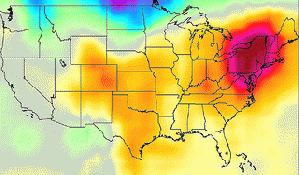Reprinted from dailykos.com by Pakalolo
My heart stopped for a few moments when I read this article from Motherboard. I pay attention to what is happening with our precarious position that we are in when it comes to climate change. I pay so much attention that at times I can't sleep due to what is happening to our air conditioners, the Arctic and Antarctica. I want to know and I need to know just as much as some of my health issues need to be known so that I know what I am up against and can either adapt or die. But still, I was hoping we would have more time to try to put the brakes on this slow moving train wreck. Instead, all hell is going to break loose I fear.
In 2011, a paper in Geophysical Research Letters tallied up the total warming data from land, air, ice, and the oceans. In 2012, the lead author of that study, oceanographer John Church, updated his research. What Church found was shocking: in recent decades, climate change has been adding on average around 125 trillion Joules of heat energy to the oceans per second.How to convey this extraordinary fact? His team came up with an analogy: it was roughly the same amount of energy that would be released by the detonation of two atomic bombs the size dropped on Hiroshima. In other words, these scientists found that anthropogenic climate is warming the oceans at a rate equivalent to around two Hiroshima bombs per second. But as new data came in, the situation has looked worse: over the last 17 years, the rate of warming has doubled to about four bombs per second. In 2013, the rate of warming tripled to become equivalent to 12 Hiroshima bombs every second.





